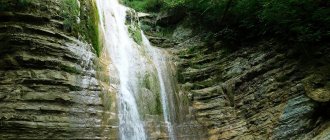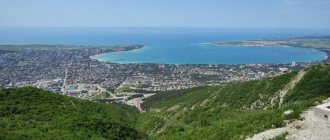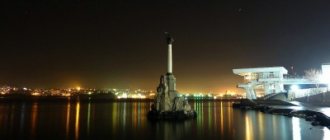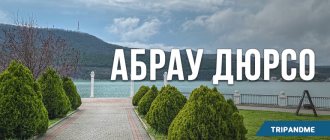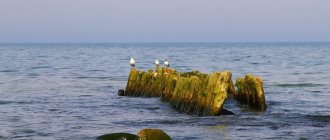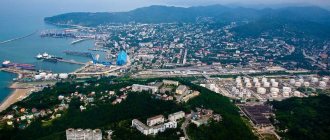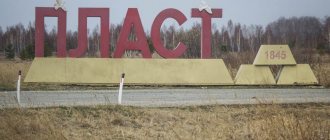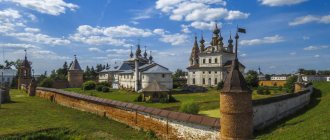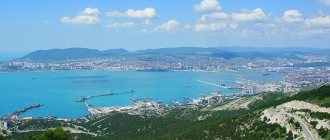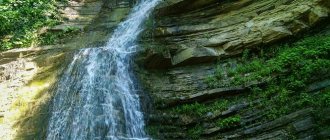Dzhanhot, Gelendzhik (Photo: Dmitry29 | Photobank Lori)
- When to go on vacation
- Where to relax
- What to see
- Vacation with children
- Prices for hotels, accommodation and food
- How to get there
- Tours
- Reviews
Dzhanhot is a small resort village on the Black Sea coast, 24 km from Gelendzhik. It is located between the villages of Divnomorskoye and Praskoveevka.
A special feature of Dzhanhot is a large number of Pitsunda pines, which create an exceptionally healthy microclimate, as well as persimmons, figs and other subtropical plants. Those who want to relax away from civilization and closer to nature come here.
This article contains information about Dzhanhot: the best time to go, what to do, what the prices are, where to live, and how to get to the resort.
Where to relax
Dzhankhot is stretched along the Khotetsai River in the direction opposite to the sea. There are only a few streets in it. The housing stock is small, and in the summer season all of it is available to vacationers. Of the large accommodation options, those closest to the sea are the Dzhanhot boarding house, the Blagodat hotel, and for children, the Leadership Academy camp.
Beaches
Central beach of Dzhankhota (Photo: Igor Arkhipov | Photobank Lori)
The beaches of Dzhanhot are covered with medium-sized pebbles. The strip of shallow water is not large, the depth increases quite quickly. You need to swim carefully with children.
The beaches of Central and Orlyonok are equipped with resort infrastructure: there are changing rooms, showers, toilets, cafes, rental of sun loungers and umbrellas. There are no equipped amenities on wild beaches. But it is deserted and picturesque.
Beaches of Dzhankhot
- Central Beach
- Beach "Eaglet"
- Beach "Behind Buna"
- Sosnovy Bor Beach
- Blue Bay Beach
What to see
The Blue Abyss tract (Photo: Igor Arkhipov | Lori Photobank)
People come to Dzhanhot to admire nature, namely the largest Pitsunda pine forest, Mount St. Nina and the clearest sea.
There are fascinating routes along the pine forest covering the mountainous terrain: hiking; for cycling and horseback riding. The route to the Parus rock is popular. It’s good to dive with a mask and fins here: interesting bottom topography, clear water, a lot of fish, crabs, shells and mollusks.
Sights of Dzhankhot
- Tract "Blue Abyss"
- House-museum of the writer Vladimir Korolenko
- Pottery workshop of Sergei Dudin, a member of the Union of Artists
- Mount St. Nina
- Rock Parus (in Praskoveevka)
- Waterfalls and dolmens (in the valleys of the Zhane and Pshada rivers)
Entertainment in Dzhanhot
- Beach attractions (children's slides, pedal boat rides, jet ski rides, banana rides, tablet rides, parachute rides, etc.)
- Diving and snorkeling
- Hiking, cycling, jeeping, horseback riding
- Excursions to the apiary and farm, with lunch and tasting of drinks in the fresh air
Excursions
You can diversify your vacation with exciting excursions. Local residents - experienced guides conduct completely different but interesting excursions: a walk around Gelendzhik, a trip to Abrau-Durso, mountain hiking, diving.
Sightseeing tour of Gelendzhik
Gelendzhik is a large resort in a beautiful Black Sea bay. The main decoration of the city is the snow-white embankment, along which there are boulevards and parks. The guide will introduce you to the traditions, culture and history of hospitable Gelendzhik.
- Book an excursion
Trekking to Cape Doob
Hike through picturesque places. Walk from Gelendzhik to Kabardinka, to the coast, to the Rio ship and along the way listen to local stories and legends, while enjoying the pristine nature.
- Book an excursion
Book excursions online
You can choose and book an individual or group excursion online. The cost of the excursion starts from 400 rubles per person. Since Dzhanhot is a small village, excursions depart from Gelendzhik.
History of the farm
After the end of hostilities in the Caucasian War (1864) and the eviction of the local Adyghe population from the Black Sea region, local lands were empty for a long time. Active settlement of the Black Sea coast of the Gelendzhik region began in the 80-90s of the 19th century
, after the transformation of Novorossiysk into a port city and the construction of the Novorossiysk-Sukhumi highway. Quite cheap plots of land began to be sold along the entire coast, which were purchased primarily by representatives of the Russian intelligentsia for the arrangement of dachas, hotels, health resorts, etc.
Dzhanhot arose as a holiday village in the early 90s of the 19th century. Fyodor Andreevich Shcherbina chose this place for his summer estate on an area of about 110 acres of land
- famous public figure and historian. Being involved in economic statistics, including Kuban statistics, he knew the Black Sea region well. And not only did he know, but already in the late 80s he had his own dacha estate with a park area on the shores of Gelendzhik, where his brother ran the farm.
In the early 90s of the 19th century, F. Shcherbina drew attention to this picturesque region
By the beginning of the 90s, F. Shcherbina acquired more than one hundred acres of land with a picturesque gorge and a sea bay close to False Gelendzhik (now Divnomorskoe). It is here that he is building his new capital dacha estate, with a road to False Gelendzhik, with vineyards and park alleys.
The mansion itself was located on the very picturesque right slope of Khotetsai, and Fyodor Andreevich named the entire estate Dzhankhot in memory of a Circassian legend. According to this legend, it was here in the Khotetsaya gorge that the noble Circassian feudal lord Dzhankhot (translated as Happy Man) once lived.
Fyodor Shcherbina founded a new estate and gave it the name - Dzhanhot
The path laid by Shcherbina to False Gelendzhik is not used for its intended purpose today, but is still called the “Shcherbinovskaya” road. In order not to live in this beautiful natural corner surrounded by Pitsunda pines in complete solitude, Fyodor Andreevich began to select intelligent neighbors for himself and was very successful in this. Korolenko brothers soon appeared in Dzhanhot
.
The retaining wall in the Korolenko Museum has been standing since 1912!
Gradually, more and more country houses grew along the Khotetsai riverbed, new gardens and vineyards appeared, and the resort town itself, originally inhabited by Shcherbina, with his light hand, became officially called Dzhanhot. After the revolutionary transformations, the dacha settlement received the status of a farm, and all the mansions located here were nationalized and repurposed as sanatoriums and children's camps.
During the Great Patriotic War, a military infectious diseases hospital was located on a small territory of Dzhankhot, and directly in the Shcherbinovsky mansion there were people infected with infectious hepatitis. The deceased patients were buried on the territory of the former manor park. Today this mass grave has a common monument.
After the war, Dzhanhot again functions as a popular Soviet resort
After the war, peaceful life had to be restored in the devastated and dilapidated farmstead. Problems can be solved quickly and easily. Korolenko's Dacha was adapted for a school building, and Shcherbina's Dacha was adapted for the Yolochka kindergarten. Today, Korolenko’s Dacha functions as a Museum, but the fate of the village’s founder’s Dacha is still in limbo.
The village itself today is one of the most popular resorts in the Gelendzhik region, where people go to swim in the clean and gentle sea, relax in a comfortable, spiritual atmosphere, enjoy beautiful views and breathe in healing air.
And in Dzhanhot you can touch the Pearl of Desires!
Vacation with children
Despite the fact that the beaches of Dzhanhot cannot boast of wide shallow waters that are comfortable for children, this quiet resort is still very good for a family holiday with children.
The village is located in the largest tract of Pitsunda pine on the coast (950 hectares). The air here is healthy; for kilometers around there are no busy highways or industrial production. An ideal place to strengthen your immune system. The resort operates children’s camps “Nadezhda” (formerly “Eaglet”) and “Leadership Academy”.
When is the best time to go?
The holiday season in Dzhankhot, as well as on the entire Black Sea coast of the Krasnodar Territory, begins in May and lasts until October. The least precipitation and the hottest weather occurs in August. By the end of summer, the air temperature rises to +30°C and above, and sea water warms up to +26...+27°C.
If you don't like the summer heat, come to the resort in June and September. At this time, the air temperature in Dzhanhot is +25…+25°С, and the sea water temperature is +22…+24°С. In autumn, it is warm during the day, and in the evenings it becomes cool, up to +15°C. Warm clothes will come in handy!
Dmitry Smirnov: “In May, the Dzhanhot farm is much warmer than the rest of the coast. During the day it is stable +22°C, at night it is slightly lower than +18°C. What’s surprising is how quickly the water warms up; by mid-May it’s already +19°C.”
Sunset at the resort. Photo: Kaiser Vilgelm II / wikimedia.org / CC BY-SA 4.0.
Prices
There are different accommodation options in Dzhanhot - from 400 to 4,000 rubles per person per day. But budget prices prevail. A place per vacationer costs from 400 rubles (in the private sector and houses of the former tourist center) to 4,000 rubles per day (in “Blagodati”). It is better to take care of booking your seats in advance.
Sanatoriums and boarding houses
There are no sanatoriums with treatment and health programs in Dzhanhot. There is a large 3-star boarding house “Dzhanhot” - with low-rise buildings and bungalow houses; with a large outdoor swimming pool, an aviary with peacocks, playgrounds and sports grounds, the Happy Life restaurant, the Chateau cafe, and an aquabar in the middle of the pool.
To visit sanatoriums, consult your doctor. Possible contraindications. Reservations for sanatoriums are made through the website of the Expert Medical Center.
- Book a trip to the Dzhankhota sanatorium
Hotels
Almost all hotels in Dzhanhot are new, mini-format. Among them, the Blagodat recreation center stands out, which has a modern interior, landscaped grounds, a large swimming pool, playgrounds, one of which is in the shape of an old ship. The price of accommodation in Dzhanhot is from 2,800 to 28,000 rubles per person per week in the summer season.
It is convenient to find out the cost and book your favorite room in Dzhanhot through Booking.com.
You can also choose a hotel or make a reservation through the Avianity hotel search. The service offers 15 accommodation options at this resort and shows offers with discounts of up to 60%.
Rental of property
There is a small private sector in Dzhanhot, so it is better to make your choice and reservation in advance. All housing is located among abundant coniferous and subtropical greenery. The streets of the village are very stretched towards the mountains, so walking from the outskirts to the beach is tiring. It's better to stay closer to the sea. The cost of living is from 400 rubles per day per person.
You can find out more about the current prices and offers for rental housing in Dzhanhot, and make a choice at Sutochno.ru. This service offers detailed and reliable information from homeowners, without overpayments or unnecessary commissions.
You can use Airbnb to rent accommodation. If you haven’t used this service yet, get a discount of up to 4,000 rubles after registering using the promotional link.
Food
The choice of canteens and cafes in Dzhanhot is small; they mainly offer Caucasian cuisine: shish kebab, grilled vegetables. A three-course lunch costs from 200 rubles. Many hotels and guest houses have their own canteens. And those vacationers who cook for themselves can buy food in local shops, or go to Gelendzhik to buy it.
Impressions from the resort
The quiet village consists of one long street, which runs along the small river Khotetsai all the way to the sea. Dzhanhot is loved for its shady sidewalks and paths, clean sea water, fresh air, the aroma of pine forests and breathtakingly beautiful sunsets. A pleasant place for a relaxing holiday by the sea!
Local residents live off tourism, so they try to earn as much as possible in the summer. Prices for housing and food cannot be called budget. There is no pharmacy in Dzhanhot, and there are few parking spaces.
Tatyana: “We had a family vacation in the coastal village of Dzhanhot. The places there are incredibly beautiful: forested mountain slopes, groves of relict pine, the sea! In the evening there is an opportunity to communicate with the smaller brothers and feed them: raccoons come to the house.”
How to get there
You can come to Dzhanhot by bus or taxi from Gelendzhik airport or from the Novorossiysk railway station. You can also take an intercity bus to the Gelendzhik bus station and then get to the resort by local public transport. Fans of road trips come to Dzhanhot in their own cars.
Airplane
The distance from Dzhanhot to Gelendzhik Airport is 23 km. For the summer, airlines are increasing the number of direct flights from Russian cities. The following airlines fly here: Aeroflot, Rossiya, S7 Airlines, Utair and others.
Gelendzhik airport address: st. Solntsedarskaya, 10 (Yandex Maps | Google Maps).
Airfare prices to Gelendzhik
- Moscow — Gelendzhik from 1,500 rub.
- St. Petersburg - Gelendzhik from 3,000 rubles.
- Ekaterinburg - Gelendzhik from 2,000 rubles.
- Novosibirsk - Gelendzhik from 5,200 rub.
- Samara - Gelendzhik from 5,100 rub.
- Tyumen - Gelendzhik from 6,000 rubles.
Top cheapest air tickets to Gelendzhik
The cheapest plane tickets to Gelendzhik, which were purchased through the Avianity search.
| departure date | Route | Transplants | Price | Search for tickets |
| 29.12.2021 | Krasnodar → Gelendzhik | Straight | 1 589 | Find tickets |
| 21.01.2022 | Belgorod → Gelendzhik | 1 transfer | 2 662 | Find tickets |
| 13.12.2021 | Pskov → Gelendzhik | 1 transfer | 2 662 | Find tickets |
| 15.12.2021 | Bryansk → Gelendzhik | 1 transfer | 2 662 | Find tickets |
| 19.12.2021 | Kaluga → Gelendzhik | 1 transfer | 2 674 | Find tickets |
| 20.01.2022 | Voronezh → Gelendzhik | 1 transfer | 2 954 | Find tickets |
| 16.01.2022 | Volgograd → Gelendzhik | 1 transfer | 3 104 | Find tickets |
| 21.12.2021 | Astrakhan → Gelendzhik | 1 transfer | 3 140 | Find tickets |
| 09.02.2022 | Moscow → Gelendzhik | Straight | 3 185 | Find tickets |
| 16.01.2022 | Simferopol → Gelendzhik | 1 transfer | 3 354 | Find tickets |
| 21.12.2021 | Yaroslavl → Gelendzhik | 1 transfer | 3 654 | Find tickets |
| 18.12.2021 | Adler → Gelendzhik | 1 transfer | 3 704 | Find tickets |
| 10.01.2022 | Makhachkala → Gelendzhik | 1 transfer | 3 734 | Find tickets |
| 28.01.2022 | Kazan → Gelendzhik | 1 transfer | 3 854 | Find tickets |
| 14.01.2022 | Cheboksary → Gelendzhik | 1 transfer | 3 860 | Find tickets |
| 25.12.2021 | Saratov → Gelendzhik | 1 transfer | 4 154 | Find tickets |
| 17.12.2021 | Kaliningrad → Gelendzhik | 1 transfer | 4 220 | Find tickets |
| 27.01.2022 | Perm → Gelendzhik | 1 transfer | 4 254 | Find tickets |
| 28.03.2022 | St. Petersburg → Gelendzhik | 1 transfer | 4 280 | Find tickets |
| 10.02.2022 | Ufa → Gelendzhik | 1 transfer | 4 364 | Find tickets |
| 22.01.2022 | Nizhny Novgorod → Gelendzhik | 1 transfer | 4 554 | Find tickets |
| 18.12.2021 | Mineralnye Vody → Gelendzhik | 1 transfer | 4 770 | Find tickets |
| 18.12.2021 | Chelyabinsk → Gelendzhik | Straight | 4 815 | Find tickets |
| 08.02.2022 | Stavropol → Gelendzhik | 1 transfer | 4 825 | Find tickets |
| 18.12.2021 | Vladikavkaz → Gelendzhik | 1 transfer | 4 870 | Find tickets |
| 03.02.2022 | Ekaterinburg → Gelendzhik | 1 transfer | 4 938 | Find tickets |
| 12.01.2022 | Samara → Gelendzhik | 1 transfer | 4 970 | Find tickets |
| 17.01.2022 | Naberezhnye Chelny → Gelendzhik | 1 transfer | 5 264 | Find tickets |
| 15.12.2021 | Kursk → Gelendzhik | 1 transfer | 5 500 | Find tickets |
| 31.01.2022 | Surgut → Gelendzhik | 1 transfer | 5 670 | Find tickets |
| 14.01.2022 | Tyumen → Gelendzhik | 1 transfer | 5 670 | Find tickets |
| 16.12.2021 | Arkhangelsk → Gelendzhik | 1 transfer | 5 898 | Find tickets |
| 24.01.2022 | Murmansk → Gelendzhik | 1 transfer | 5 954 | Find tickets |
| 23.03.2022 | Rostov-on-Don → Gelendzhik | 1 transfer | 6 179 | Find tickets |
| 20.12.2021 | Ulyanovsk → Gelendzhik | 1 transfer | 6 240 | Find tickets |
| 07.04.2022 | Lipetsk → Gelendzhik | 1 transfer | 6 282 | Find tickets |
| 20.12.2021 | Anapa → Gelendzhik | 1 transfer | 6 317 | Find tickets |
| 13.12.2021 | Kirov → Gelendzhik | 1 transfer | 6 391 | Find tickets |
| 17.12.2021 | Minsk → Gelendzhik | 1 transfer | 6 482 | Find tickets |
| 13.12.2021 | Petrozavodsk → Gelendzhik | 1 transfer | 6 509 | Find tickets |
Airfare prices to Gelendzhik by month
The low-price calendar for air tickets to Gelendzhik selects the cheapest flights from your city by day and month for the year in advance.
Transfer from airport
You can get from Gelendzhik Airport to Dzhanhot by bus with a transfer or by taxi without transfers. A trip by public transport costs on average 150-200 rubles, by taxi from 1,200 rubles. Travel time is 2-3 hours.
A more convenient travel option is a taxi transfer, which can be booked online in advance. At the airport, passengers will be met by a driver and taken to the resort. The cost of the service is from 1,000 rubles, the travel time is 30 minutes.
Train
The nearest train station to Dzhankhot is located in Novorossiysk, which is 53 km from the resort. Long-distance passenger trains from Russian cities arrive here daily.
Novorossiysk railway station address: st. Zhukovsky, 16 (Yandex Maps | Google Maps).
Prices of train tickets to Novorossiysk
- Moscow — Novorossiysk from 3,200 rub.
- Krasnodar - Novorossiysk from 650 rub.
- Samara - Novorossiysk from 700 rub.
- Saratov - Novorossiysk from 3,000 rubles.
- Krasnoyarsk - Novorossiysk from 3,400 rubles.
- Nizhny Novgorod - Novorossiysk from 3,900 rubles.
It is convenient to search and book train tickets online through Avianity.
Bus
To come to Dzhanhot by intercity bus, you first need to get to Gelendzhik. Next, change to local transport and go to the resort.
Gelendzhik bus station address: st. Obezdnaya, 3 (Yandex Maps | Google Maps).
Bus ticket prices to Gelendzhik
- Moscow — Gelendzhik from 3,200 rub., 19 h.
- Mineralnye Vody - Gelendzhik from RUB 1,800, 7 hours.
- Maykop - Gelendzhik from 800 rubles, 8 hours.
- Krasnodar - Gelendzhik from 700 rubles, 4 hours.
- Rostov-on-Don - Gelendzhik from 1,300 rubles, 10 hours.
You can check the schedule and buy bus tickets online on Avianity.
Automobile
Dzhanhot is located 12 km from the M-4 Don federal highway, along which you can come here from different cities of Russia. The distance to Dzhanhot from Novorossiysk is 58 km, from Krasnodar - 193 km, from Moscow - 1,500 km.
The only winding mountain road leading from M-4 to the resort itself is from Svetly and past Divnomorskoye. It is a dead end: after another 10 km it ends in Praskoveevka.
Public transport
Dzhanhot is a compact village, so there is no internal public transport here. Buses and minibuses connect Dzhanhot with Divnomorskoe, Praskoveevka, Gelendzhik and Novorossiysk. The schedule is posted at the only bus stop in the village.
Taxi
You can get to Dzhanhot by taxi both from Gelendzhik and Novorossiysk. You can also call a taxi to the village. A trip around Dzhanhot costs 80-100 rubles.
Car rent
The nearest car rental services are in Gelendzhik. You can use the services of local rental companies, where the cost for 1 day of rental starts from 1,000 rubles.
You can book a car online in Gelendzhik through local rental services.
Main attractions
Despite the fact that the village of Dzhanhot, with a population of just over 400 people, is quite small, it has its own quite famous attractions. Of course, the most famous Dzhankhot attractions are the former estates of the founder of the farm - F. Shcherbina
and writer
V. Korolenko
, author of the famous “Children of the Dungeon”, “The Blind Musician” and other works. But if today there is a House Museum on the writer’s estate and there is a memorial exhibition telling about the events connecting Vladimir Korolenko with Dzhankhot, then F. Shcherbina’s estate as such is basically absent. But it is very interesting to stroll along the abandoned alleys of this once prosperous economy, although almost no historical objects have been preserved there.
Korolenko's dacha is today the only surviving example of a former dacha village
V. Korolenko and F. Shcherbina were representatives of the same generation - the “seventies”, and in many ways their life paths were similar. Both of them were keen on the idea of populism, both of them were subject to arrest and administrative punishment in the form of exile for this. Both of them were worried about the future of Russia. And most of their personal meetings and intimate conversations took place in Dzhanhot.
Estate of F. Shcherbina
The Shcherbina estate itself, as noted, no longer exists today. Part of its former lands is occupied by mini-hotels, resort facilities, children's camps, etc. The original landscape layout, taking into account the terrain, park alleys, and dilapidated flights of stairs have been completely lost.
Although, what can we say about the estate, when the very name of the founder of this resort, so popular today, was quite recently in complete oblivion. But everything returns to normal, and historical reality in departed persons and events again rises from oblivion, bringing amazing discoveries and revelations to new generations. So who was Fyodor Andreevich Shcherbina?
Today the name and merits of Fyodor Shcherbina are becoming known to new generations
A Cossack by birth, a graduate of the Stavropol Theological Seminary, an unsuccessful student at Novorossiysk University, exiled for participating in the “going to the people” movement, Fyodor Andreevich subsequently became a prominent political and public figure, poet and writer, and a famous historian. And, in addition, he was a very energetic and active entrepreneur, actively promoting the development of Gelendzhik resorts.
Fyodor Shcherbina spent his entire life studying the problems of Russian land communities, artel movements, and the Cossack economic structure. Based on the collected statistical data on these problems, he wrote several works and journal articles. At the end of the 19th and beginning of the 20th century, F. Shcherbina headed the Voronezh Statistical Bureau for about 20 years, simultaneously engaged in large-scale budget research of Voronezh peasant farms. It was during that period that he founded the Dzhankhot estate, which over time turned into a resort settlement on the Krasnodar coast.
Shcherbina's dacha in its current version only vaguely resembles its former mansion
For the active manifestation of liberal views in 1903, Shcherbina was sent into administrative exile, which he served on his Dzhankhot estate, where he remained until October 1904. Subsequently, in the State Duma he represented the interests of the Cossack Party and the People's Socialists. In creating the major scientific “History of the Kuban Cossack Army,” covering the period from 1693 to 1888, his assistant was S. Petlyura, the future famous ataman of the Civil War.
The history of the Kuban Cossack army is the main research work of F.A. Shcherbina
After the Civil War, Fyodor Andreevich, who was already in his 80s, emigrated abroad and eventually settled in the Czech Republic, where he worked as a professor of statistics, participated in the Ukrainian emigration scientific movement, and wrote poems in Ukrainian. He died in Prague in 1936, where he was buried. And in Russia the name of this historian and public figure was consigned to oblivion for a long time. However, in 2008, his merits and name were revived, and his ashes were transported for reburial to Krasnodar.
A monument to Fyodor Andreevich was also erected in Krasnodar
The estate of F. Shcherbina in Dzhankhot is historically the very first building on this land. All manor buildings were placed very rationally and taking into account the local terrain. Previously, country houses were not built on the so-called first line, so the place for the mansion was chosen on a mountain slope, between the valley and the gorge, later called the “Shcherbinovskaya gap,” at a distance of 500-600 meters from the coastline.
The mansion itself was not very large by modern standards. It was a one-story house with a mezzanine and a balcony, to which serpentine paths and park staircases flocked. And from the mezzanine windows there was an excellent overview of the picturesque estates with gorges and valleys, mountains and the seashore. And if you consider that the main plants growing in these places were relict Pitsunda pines, then you can imagine all the beauty and charm that reigned here at the turn of the 19th and 20th centuries. Today, most of the former estate is a natural protected area - the Dzhankhotsky forest of Pitsunda pine.
Shcherbina's estate was located among relict Pitsunda pines
Quite successfully, Fyodor Andreevich was engaged in viticulture on his estate; on his former territory, a semi-underground winery, which is a rare example of industrial architecture, and a wine cellar have been preserved. It was this winery that made it possible to stimulate the cultivation of grapes throughout the area, providing producers with the opportunity to sell the harvest.
As already mentioned, Shcherbina was well known in Gelendzhik, where he had two houses with a large park area, a paid resort bath with excellent service, etc. Fyodor Andreevich promoted local resorts everywhere, and the residents of Gelendzhik, as a sign of respect, elected him to the board of the city Consumer Society.
After the revolutionary transformations, on the site of the Shcherbinovsky estate there was a children’s camp “Builder” (later the camp “Malozemelets”), and the 19th-century dacha building itself ended up on the northern outskirts of the camp and pioneer leaders lived in it. From the mansion to the main camp area there were park stairs and pedestrian paths, then still well preserved from the first owner.
The memory of F. Shcherbin is preserved only on a memorial plaque
After the Great Patriotic War, it was decided to convert the Shcherbina estate into a kindergarten. As a result of this restructuring, the first 19th century mansion in Dzhanhot, a monument of history and architecture, completely lost its appearance. Instead of a mezzanine with a balcony, a hipped roof appeared, and the entire internal layout was completely changed. The territory of the kindergarten became isolated from the territory of the pioneer camp, and all the park alleys gradually became wild and overgrown. The stairs, which had been in service since the end of the 19th century, had almost collapsed.
In the 90s of the last century, during the period of awakening interest in the history of the country, the little-studied past, interest in the Estate of F. Shcherbina was revived. However, during the same period other processes were taking place in society. The kindergarten was closed, and the completely modified, two-story building became the family dormitory of the Dzhanhot boarding house.
The issue of restoring the Shcherbina Country Estate has not yet been resolved
The issue of creating a memorial museum for F. Shcherbina has been raised several times, but a decision on it has not yet been made. Today, curious tourists can only walk around the former estate territory, see the rebuilt mansion with a memorial plaque, as well as beautiful picturesque views of the gorge and thickets of Pitsunda pine. And just remember, and, if desired, learn as much as possible about the founder of Dzhanhot - an energetic man with an active life position, Fyodor Andreevich Shcherbin.
House-Museum of V.G. Korolenko
The acquaintance of the writer V. Korolenko with Shcherbina took place in the 80s of the 19th century in Nizhny Novgorod, but it was of a rather “casual” nature. However, by the end of the 90s, the writer’s younger brother Illarion, suffering from heart disease and tuberculosis, asked to find him a place for a summer cottage in a dry subtropical climate. Therefore, Vladimir Korolenko turned for help to F. Shcherbina, who was well familiar with the conditions and climate of the Black Sea region.
By chance, the writer V. Korolenko also became a resident of the Dzhankhot estate
At the invitation of Fyodor Andreevich, the writer visited Dzhanhot in early July 1998
, and together they chose a site, discussed the possibilities of conducting viticulture and other economic activities here, the cost and delivery of building materials and other important issues.
And so, already at the very beginning of the 20th century, the Korolenko Estate appeared here. Today, this historical and architectural monument of the early 20th century houses the Museum of the writer V. Korolenko
.
Of great interest is the fact that the estate itself, a three-story stone mansion, decorated with carved openwork white balconies and verandas and covered with natural tiles, was built according to the handwritten drawings of the writer, who took an active part in the construction of the estate itself. The place chosen for construction turned out to be very picturesque - this is the slope of Mount St. Nina, where wonderful specimens of Pitsunda pine grow.
The Korolenko brothers' dacha was built based on a sketch made by the writer
Hilarion himself dealt directly with the development of this territory, uprooting the slopes, arranging the vineyards and garden, laying the road and other economic problems. And Vladimir and other close relatives came to this estate for the summer, along with their wives, husbands, children and friends.
Korolenko’s closest neighbor, F. Shcherbina, often came to see Korolenko for evening tea. At a large table with 2-3 samovars, friendly conversations continued long after midnight. The writer told interesting sad and funny stories; Fyodor Andreevich was not inferior to him, whose stories were distinguished by great expressiveness and artistry.
Surprisingly soulful evening gatherings took place in Korolenko’s house
Since 1912, Hilarion, having completely retired, settled with his family in Dzhankhot on a permanent basis. In the remaining time of his life, he builds a stone outbuilding, landscaping and landscaping the estate, and arranges a utility yard, which is located below the estate. On the farm yard there were stables, a carriage house, a hayloft, a barnyard and servants' housing.
The writer loved to come to this quiet and amazingly picturesque place to visit his brother and rested here more than once, combining relaxation with work on literary works. Here Vladimir Korolenko wrote essays about Chekhov and Chernyshevsky, and many articles for literary magazines were written here. The writer loved to swim in the sea, walk in the mountains, ride horses and receive his friends here. Korolenko later admitted that his happiest moments in life took place in Dzhanhot.
Maybe it was in Dzhanhot that these wonderful words came to mind for V. Korolenko
The writer's last visit to Dzhanhot took place in 1915 and was associated with the death of his beloved younger brother.
In the first years of Soviet power, the estate was adapted into a colony for street children, which grew into a commune in the 30s. Subsequently, there were recreation centers and pioneer camps here. In 1953, a museum corner for V. Korolenko was opened in a small outbuilding of the estate, and a little later a memorial plaque appeared on the building.
This Lebanese cedar has survived several wars, revolutions and other upheavals.
This amazing and interesting Korolenko Memorial Museum is located at the very end of Dzhankhot on the right side of Chernomorskaya Street. It is open daily from 9 a.m. to 5 p.m. The museum offers several themed tours, so the choice is yours. Without an excursion, it will be quite difficult to understand the writer’s world and the circumstances of his life, but you can inspect the house itself, the outbuildings, visit the grave of Illarion Korolenko and the nearby dilapidated Dacha of Baroness Schmidt - the mother of the famous Lieutenant Schmidt - on your own.
In the vicinity of the Korolenko Museum you can find the ruins of former country mansions
Pottery workshop of the Dudins
Morskaya harbour, 46
On the outskirts of Dzhankhot and a little away from its residential part - on the territory of the SNT "Sea Harbor" - there is a very interesting place, which, like the Old Park in Abardinka, was created by the dream and work of almost one person - in this case, Sergei Dudin
. This is a pottery workshop, which is also a small Museum of handmade ceramic products. Master classes on working with clay and mastering the potter's wheel are held here, and here you can buy your favorite product as a souvenir or as a gift in a small shop.
The pottery workshop is today a family business for the Dudins
Sergei Dudin and his wife and colleague Vera are members of the Kuban Union of Artists, participants in numerous domestic and foreign exhibitions and festivals. In Sweden, for example, there is a cafe decorated with products from this workshop. Mosaics made from tiles from this workshop are present in the design of the churches of Gelendzhik and Divnomorskoye.
The workshop has been operating for more than 20 years, and today the Dudin children are taking over the family tradition. Sergei himself conducts tours around the workshop, talking about his creativity, the work of the potter, how he went towards his goal, and what kind of plot works are presented here. He also conducts master classes himself.
The process of creating pottery is like magic!
In the Museum you can see various decorative panels, pottery and children's toys, ceramic tiles and jewelry. A lot of panels were made based on folk costumes of Russian provinces. Sergei spent many years of his life creating his own workshop. For the sake of this dream, he ultimately abandoned his existing specialty and decided to revive the dying trade in this small resort outback practically from scratch.
Sergei began by making the most ordinary children's whistles, which he sold in Krasnodar on a pedestrian street. There he met art student Vera, and then they worked together. Without special education, it was very difficult to create diverse ceramic products. But Sergei was lucky enough to meet an experienced teacher, and in a short time he mastered both the potter's wheel and the production of ceramic tiles and panels.
Even the workshop yard is lined with homemade tiles
Today, Sergei and his wife make not only the most common ceramic products. They make ceramic icons for the temple and themselves lead a completely Orthodox lifestyle. It is very interesting to learn that clay for products needs to be prepared for a very long time - sifted, washed, dried, etc. This preparation takes many months. Then the clay must be kneaded with your hands for a long time like dough to expel air bubbles, and only then it is sent to the potter's wheel.
And completely varied and beautiful products come off the pottery wheel.
Sit at the pottery wheel yourself, and with your own hands feel how soft and pliable clay turns into a product - a pot or cup, and then paint this product with your own hands and take it home. What could be more beautiful than the creative process, during which something amazingly beautiful comes out of nothing!
You can visit this workshop daily from 10 a.m. to 6 p.m. It’s better to sign up for a tour or master class in advance.
If you are vacationing in the vicinity of Dzhanhot with children, then visit this workshop
Sanctuary "Dzhankhotsky Bor"
Today, part of the former estate of F.A. Shcherbina has entered the territory of a natural reserve called “Dzhankhotsky Bor”. This is a 6-kilometer strip of thickets of relict Pitsunda pine, stretched along the sea coast, many specimens of which have crossed the 100-year mark. Its pine needles enrich the local air with healthy phytoncides, and they themselves are so picturesque that you can walk here for hours. In the Dzhankhot forests, the lungs are perfectly cleansed of urban gas pollution
Mount St. Nina
On the left outskirts of Dzhankhot there is one of the local natural attractions, already mentioned by us - Mount St. Nino. This name is associated with the name of a famous saint who preached Christianity in Georgia at the turn of the 3rd-4th centuries. According to local legend, in ancient times a woman named Nina also appeared in the local temple. One day, during a thunderstorm, lightning struck the temple, causing a strong fire in which all the monks died. But local Nina miraculously remained alive, just as her Holy namesake, who lived centuries earlier, miraculously escaped death in pagan Armenia.
Mount St. Nina - a local natural landmark and walking destination
Dzhankhotskaya Nina lived in solitude, on the top of a mountain, where she cultivated her garden, dug a well herself, spent time in prayer and helped heal all those who were suffering. The mountain was named after St. Nina in memory of the Georgian canon and in honor of the one living here. No one knows how the life of the local hermit ended. They say that on the mountain top, where Nina lived, from time to time a gray-haired old man appeared, who attached an icon to a tree and placed a cross at the base of the mountain. What kind of old man it was, why he did it, and whether it happened at all is also a mystery, shrouded in darkness.
But it is known that in the 19th and 20th centuries, monks actually came to this mountain to pray. They recognized that the mountain had a beneficial effect on their abilities. Then the question of creating a monastery on this mountain was seriously considered. But 1917 came and the question disappeared by itself.
Today you can visit the top of this mountain on your own.
Today you can climb Mount St. Nino on foot. And although this climb is quite steep, many vacationers enjoy going up there again and again. After all, at the top you can experience an incredible feeling of flight, happiness and see the beautiful distances of the sea, the Parus Rock in the area of the village of Praskoveevki, Cape Idokopas and so on.
The views from the top of Mount St. Nina are simply mesmerizing!!!
Rock Sail
The Parus Rock, which is a fairly well-known landmark of the Gelendzhik region, is geographically located closer to the village of Praskoveevka, but you can reach it from Dzhankhot on foot along the sea coast. And this must be done without fail.
Rock Parus - an amazing natural phenomenon and a place of tourist attraction
Firstly, the five-kilometer journey to the rock itself will pass through very picturesque places, and secondly, wonderful photographic documents of a well-spent summer day will remain as a souvenir.
The Parus rock is a unique natural landmark in the form of a rather large piece of a quadrangular layer of sandstone, located perpendicular to the main rock mass and separated from it by some distance. The width of the Sail is only a meter, and the height is 25-30 meters.
The sail seems to float away from the coastline towards the waves
The reason for the formation of the hole in Parus Rock is not known, although there are several versions regarding this. The rock also has an abandoned and partially destroyed climbing route, which is not advisable to climb. But you can and should take pictures from different angles near this rock, remarkable in all respects!
The hole in the rock is a popular photo shoot spot
If you don’t have the strength and ability to make the trek to the rock on foot, you can get to the village of Praskoveevka by your car, bus, taxi or boat. Excursions depart here from almost any beach. And we must keep in mind that reaching the cliff along the edge of the sea becomes more difficult year after year, because frequent rockfalls have almost blocked the path. Therefore, you need to wear very light, comfortable and non-slip shoes.
Despite the difficulties, tireless tourists constantly go to the rock
Reviews about holidays in Dzhanhot
Dzhanhot is a secluded place where there are few people, a minimum of civilization and empty beaches.
Andrey
A small village, remote from Gelendzhik and other resorts. This is a secluded bay where there is peace and quiet. There is the cleanest sea and healthy pine-sea air.
Oksana
A nice cozy cove and a village consisting of a couple of streets. The sea here is clean and blue, the air is healing. The resort is suitable for those who need silence, the absence of the usual southern entertainment.
Luda
The cleanest sea and empty beaches, we saw dolphins very often. This place is well suited for lovers of hiking and cycling - the air is clean, there is no pollution from cars, beautiful nature and silence, sunsets.
Sonya
Excursions from Dzhanhot
Since there is not much entertainment in the Dzhanhot village itself, their lack can be compensated for by trips to nearby large tourism centers - to Gelendzhik or Novorossiysk. If you have your own car, this is not a problem, but if you don’t have one, there are always local tourist services that will provide transport and organize an infotainment program. If you still want to get to know these cities on your own, you can use a bus or taxi.
Visit to Gelendzhik
- this is not only a walk along its beautiful and vibrant embankment, one of the largest in Europe.
In addition, in Gelendzhik you can visit museums
, temples, water parks, oceanariums and a Dolphinarium.
Gelendzhik is one of the most popular and beautiful resort towns in the Black Sea region
There are also such popular tourist entertainment parks in Gelendzhik as Safari Park
and the
Olympus Mountain Park
. Many small entertainment amusement parks are located near the Embankment. More detailed information about the attractions and entertainment places of Gelendzhik can be found here.
Tourists also go to a small village behind Gelendzhik - Kabardinka. This is a very pleasant place with a lot to see and have fun. The most advertised place in Kabardinka is the territory of the “Old Park”, but there are other places here that are worthy of visiting. It is very interesting to visit the preserved site of Captain A. Zubkov’s Battery, where today one of the popular Krasnodar memorials from the Great Patriotic War is located.
The Captain Zubkov Battery Memorial is one of the attractive tourist places
There is also a Monument to the victims of peacetime - the shipwreck of the ship "Admiral Nakhimov". Many people visit this place to honor the memory of more than 400 human lives that were suddenly cut short.
There are also interesting entertainment places in Kabardinka, such as the Crocodile Canyon, and the interesting Museum of Glass. There is the City of Kuban Masters and other amazing and beautiful objects. You can find out more about all the interesting and worth visiting places in Kabardinka here.
It is interesting to visit the hero city of Novorossiysk. Take a walk through its large port and its streets. Visit the Malaya Zemlya Memorial.
The “Malaya Zemlya” Memorial in Novorossiysk is also one of the places visited by tourists
You can go on a tour of natural attractions and see beautiful waterfalls or ancient dolmens. It is better to go on these trips as part of organized groups.
Author of the article: Kasatkina Tatyana
